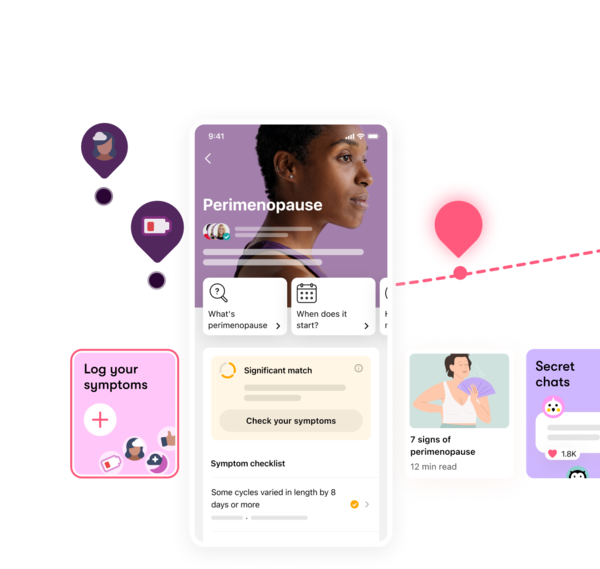Two-thirds of women experience perimenopause or menopause brain fog. Here’s what causes it and what can help.
-
Tracking cycle
-
Getting pregnant
-
Pregnancy
-
Help Center
-
Flo for Partners
-
Anonymous Mode
-
Flo app reviews
-
Flo Premium New
-
Secret Chats New
-
Symptom Checker New
-
Your cycle
-
Health 360°
-
Getting pregnant
-
Pregnancy
-
Being a mom
-
LGBTQ+
-
Quizzes
-
Ovulation calculator
-
hCG calculator
-
Pregnancy test calculator
-
Menstrual cycle calculator
-
Period calculator
-
Implantation calculator
-
Pregnancy weeks to months calculator
-
Pregnancy due date calculator
-
IVF and FET due date calculator
-
Due date calculator by ultrasound
-
Medical Affairs
-
Science & Research
-
Pass It On Project New
-
Privacy Portal
-
Press Center
-
Flo Accuracy
-
Careers
-
Contact Us
Menopause brain fog: What does it feel like, and what can help?


Every piece of content at Flo Health adheres to the highest editorial standards for language, style, and medical accuracy. To learn what we do to deliver the best health and lifestyle insights to you, check out our content review principles.
From misplacing your house keys to forgetting a colleague’s name, we all experience the odd memory glitch. But while it’s perfectly normal to lose focus occasionally, if you frequently struggle to finish sentences or recall important details, then you might be experiencing a common symptom of perimenopause and menopause: brain fog.
You’ve probably heard of menopause but might be wondering what perimenopause is. Confusingly, the terms are often used interchangeably, but they’re actually two different things. Perimenopause is the years leading up to menopause (your last period). You’re diagnosed as having gone through menopause when you haven’t had a period for 12 months (usually between the ages of 45 and 55). From then on, you are postmenopausal.
However, this process doesn’t happen all at once. Perimenopause can last for years and usually begins somewhere between your late 30s and 50s — most often in your 40s. Perimenopause is often marked with symptoms such as hot flashes, night sweats, and irregular periods caused by hormonal changes.
And while brain fog can be caused by a wide range of other things, such as chronic stress, blood sugar imbalances, and autoimmune conditions such as lupus, it is also a common symptom of both perimenopause and menopause, so that will be our focus here. Let’s learn more about it.
Key takeaways
- 2 out of 3 women experience perimenopause or menopause brain fog.
- This type of brain fog is thought to be related to hormonal imbalance and usually improves after menopause.
- Lifestyle changes and potentially hormone therapy can help to manage brain fog, so you don’t need to put up with it.
Take a quiz
Find out what you can do with our Health Assistant
Brain fog: What is it?
Brain fog describes that frustrating feeling when you just can’t think clearly. “It refers to a lack of focus, mood changes, poor memory, and difficulty concentrating that can be experienced during the menopausal transition,” explains Dr. Ruth Arumala, an obstetrician, gynecologist, and gynecologic and cosmetic surgeon in Texas, US.
Is brain fog common?
If it feels like you’ve been sleepwalking through life lately, you are not alone. According to research, as many as 2 out of 3 women experience some degree of memory problems during the transition to menopause. Brain fog is a symptom of perimenopause and menopause, alongside hot flashes, night sweats, and vaginal dryness.
While symptoms differ for everyone, menopause brain fog can be debilitating, especially when combined with other factors like a high-pressure job, parenting, or caring for aging relatives. In one survey exploring work, over 39% of women reported low concentration, tiredness, and poor memory, resulting in a significant impact on their productivity. This can be incredibly frustrating, but rest assured — there are treatment options available.
What causes perimenopause or menopause brain fog?
Doctors don’t know the exact cause of brain fog, so the results from research have been conflicting. But the most common theory is that menopause brain fog is hormone related. In particular, it could be linked to the natural drop in estrogen that occurs during perimenopause. This thinking makes sense because we know that estrogen does play a role in brain function. During perimenopause, your hormone levels start to fluctuate, and then when you transition into menopause, they dramatically decrease. However, research so far has not confirmed the link between estrogen changes and brain fog.
What’s more, other common perimenopause or menopause symptoms could also contribute to brain fog. It’s not surprising that disturbed sleep and a low mood can all result in difficulties with thinking and memory, leading to a foggy-brained feeling that’s hard to shake.
What does perimenopause or menopause brain fog feel like?
If you’ve ever experienced a hangover, transatlantic jet lag, or a newborn baby cluster feeding at 4 a.m., you will have some idea about what menopause brain fog feels like. But while a double espresso and a good night’s sleep can fix most of these, this type of brain fog is more difficult to shake off.
“It can be overwhelming,” Annie,* 47, a social worker from Cambridge, UK, tells Flo. “Often I can’t remember words or finish sentences, and I feel quite frustrated and exhausted by it all.”
Annie’s perimenopausal symptoms also fluctuate. “It’s definitely worse when I am tired or particularly stressed,” she says. “But you do learn to live with it. I am slowly getting used to feeling woolly headed and have learned to slow down.”

Brain fog treatment: What helps?
If brain fog is messing with your life, there are things you can do to help clear your mind.
Self-help for menopause brain fog
- Rest. Sleep is essential for brain health, and a lack of sleep could contribute to brain fog. “Work on healthy sleep habits and hygiene to give the brain periods of rest,” says Dr. Nazaneen Homaifar, obstetrician and gynecologist, Inova Health System, Washington, DC, US. If your sleep is disturbed because you’re being woken up by night sweats, you could try keeping your thermostat slightly lower than usual or invest in some lightweight and breathable bedding and nightwear to keep you cool at night. You could also cut out alcohol, caffeine, and spicy foods in the evening, as these all cause your temperature to spike, contributing to sweating.
- Get moving. Research suggests that regular exercise could help improve memory and reduce brain fog. “Ensure your cardiovascular health is in check,” adds Dr. Homaifar. “Uncontrolled diabetes, cholesterol, and hypertension can all affect brain health.”
- Train your brain. Challenge your brain using puzzles, reading, or learning a new language or skill. “Anything that helps improve brain health is going to help improve brain fog,” says Dr. Homaifar.
- Get therapy. Cognitive-behavioral therapy might ease low mood, anxiety, and sleep problems that contribute to brain fog, helping to reduce the symptom.
- Quit the habit. Dr. Homaifar says that trying to stop smoking could help reduce brain fog. “Tobacco can affect brain health, so quitting smoking is really helpful in improving it,” she says.
- Manage your weight (if you want to). A 2013 study found that memory improved in postmenopausal, overweight women after they lost weight by dieting.
The most common theory is that menopause brain fog is hormone related. In particular, it could be linked to the natural drop in estrogen that occurs during perimenopause
Medication for menopause brain fog
- Hormone therapy: Hormone therapy (also known as hormone replacement therapy or HRT) can help to reduce the symptoms of perimenopause. While the evidence is mixed around whether or not it can help with brain fog, if other perimenopause symptoms are bothering you or could be contributing, your doctor might recommend trying it. It works by boosting your levels of hormones, which naturally dip during this time.
When to see your doctor and what to say
Menopause brain fog can be debilitating and make day-to-day life more stressful. But the good news is that your doctor can help, so make booking an appointment with them a priority.
“Talk to your doctor if memory changes come on suddenly, your hot flashes are affecting your quality of life and your ability to get restful sleep, or if you’re worried about changes in your mood and worsening depression and anxiety, as it can also affect brain fog,” advises Dr. Homaifar.
It might help to prepare for your appointment by making a list of any other symptoms you’re experiencing and any treatments you’ve tried to relieve brain fog symptoms. You might also want to ask your doctor questions, including whether you’ll need any tests, what treatment options are available, and what else you can do to help to reduce your symptoms.
During the appointment, your doctor can figure out what’s going on, talk you through the different treatment options available, and provide the support you need.
*Name has been changed
More FAQs
How long does menopause brain fog last?
Brain fog symptoms can occur at any stage throughout perimenopause and menopause. “How long it lasts varies from patient to patient,” says Dr. Arumala.
The good news is that menopause brain fog is usually temporary. Once your hormone levels settle, your cognitive function should return to normal. “Most women will notice that their verbal memory is most affected during perimenopause and that it improves and can return to baseline two to three years after menopause,” adds Dr. Homaifar.
Does the brain recover after menopause?
It can be a confusing time, but evidence suggests that your learning ability and memory can return. In 2009, researchers analyzed more than 2,000 women over four years and found that cognitive issues improved after menopause.


Hey, I'm Anique
I started using Flo app to track my period and ovulation because we wanted to have a baby.


The Flo app helped me learn about my body and spot ovulation signs during our conception journey.


I vividly
remember the day
that we switched
Flo into
Pregnancy Mode — it was
such a special
moment.
Real stories, real results
Learn how the Flo app became an amazing cheerleader for us on our conception journey.
References
“Brain Basics: Understanding Sleep.” National Institute of Neurological Disorders and Stroke, www.ninds.nih.gov/health-information/public-education/brain-basics/brain-basics-understanding-sleep. Accessed 4 Oct. 2023.
“Brain Fog.” The Menopause Charity, www.themenopausecharity.org/2021/10/21/brain-fog/. Accessed 4 Oct. 2023.
Gava, Giulia, et al. “Cognition, Mood and Sleep in Menopausal Transition: The Role of Menopause Hormone Therapy.” Medicina, vol. 55, no. 10, Oct. 2019, http://doi.org/10.3390/medicina55100668.
Greendale, G. A., et al. “Effects of the Menopause Transition and Hormone Use on Cognitive Performance in Midlife Women.” Neurology, vol. 72, no. 21, May 2009, pp. 1850–57, pubmed.ncbi.nlm.nih.gov/19470968/.
Griffiths, Amanda, et al. “Menopause and Work: An Electronic Survey of Employees’ Attitudes in the UK.” Maturitas, vol. 76, no. 2, Oct. 2013, pp. 155–59, pubmed.ncbi.nlm.nih.gov/23973049/.
Hames, Marty Velasco. “Mayo Clinic Minute: Does Menopause Cause Brain Fog?” Mayo Clinic News Network, 7 June 2023, newsnetwork.mayoclinic.org/discussion/mayo-clinic-minute-does-menopause-cause-brain-fog/.
“Hormone Therapy for Menopause Symptoms.” Cleveland Clinic, my.clevelandclinic.org/health/treatments/15245-hormone-therapy-for-menopause-symptoms. Accessed 4 Oct. 2023.
“Hot Flashes: What Can I Do?” National Institute on Aging, www.nia.nih.gov/health/hot-flashes-what-can-i-do. Accessed 24 Oct. 2023.
Krishnan, Kamini. “Strategies for Busting Up Brain Fog.” Cleveland Clinic, 14 June 2022, health.clevelandclinic.org/brain-fog/.
“Menopause.” NHS, www.nhs.uk/conditions/menopause/. Accessed 4 Oct. 2023.
“Menopause 101: A Primer for the Perimenopausal.” The North American Menopause Society, www.menopause.org/for-women/menopauseflashes/menopause-symptoms-and-treatments/menopause-101-a-primer-for-the-perimenopausal. Accessed 4 Oct. 2023.
“Overview: Cognitive Behavioural Therapy (CBT).” NHS, www.nhs.uk/mental-health/talking-therapies-medicine-treatments/talking-therapies-and-counselling/cognitive-behavioural-therapy-cbt/overview/. Accessed 4 Oct. 2023.
“Perimenopause.” Cleveland Clinic, my.clevelandclinic.org/health/diseases/21608-perimenopause. Accessed 4 Oct. 2023.
“Physical Activity Boosts Brain Health.” Centers for Disease Control and Prevention, www.cdc.gov/nccdphp/dnpao/features/physical-activity-brain-health/index.html. Accessed 11 Oct. 2023.
SWAN Fact Sheet: Memory and Cognition during and after the Menopause Transition. SWAN, www.swanstudy.org/wps/wp-content/uploads/2023/04/SWAN-Fact-Sheets-Cognition.pdf. Accessed 4 Oct. 2023.
Weber, Miriam T., et al. “Cognition in Perimenopause: The Effect of Transition Stage.” Menopause, vol. 20, no. 5, May 2013, pp. 511–17, pubmed.ncbi.nlm.nih.gov/23615642/.
History of updates
Current version (14 November 2023)
Published (17 November 2023)
In this article

Track your perimenopause journey in the Flo app
-
Log symptoms and get tips to manage them
-
Learn what to expect with expert-led articles and videos
-
Connect with others who can relate to how you're feeling




